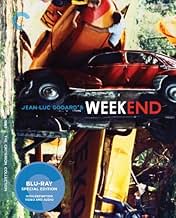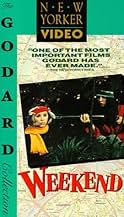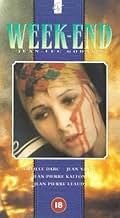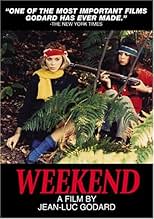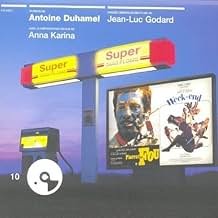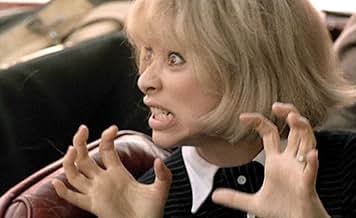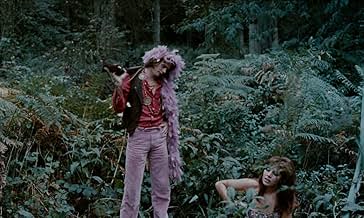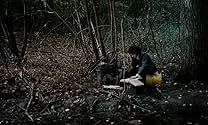NOTE IMDb
6,9/10
16 k
MA NOTE
Une histoire surréaliste d'un couple marié prenant la route afin de rendre visite aux parents de la femme et de les tuer pour l'héritage.Une histoire surréaliste d'un couple marié prenant la route afin de rendre visite aux parents de la femme et de les tuer pour l'héritage.Une histoire surréaliste d'un couple marié prenant la route afin de rendre visite aux parents de la femme et de les tuer pour l'héritage.
- Réalisation
- Scénario
- Casting principal
- Récompenses
- 1 victoire et 4 nominations au total
Yves Afonso
- Gros Poucet
- (non crédité)
Yves Beneyton
- Un membre du FLSO
- (non crédité)
Juliet Berto
- Une activiste du FLSO
- (non crédité)
- …
Michèle Breton
- Girl in the woods
- (non crédité)
Michel Cournot
- Man From Farmyard
- (non crédité)
Lex De Bruijn
- Revolutionary
- (non crédité)
Jean Eustache
- L'auto-stoppeur
- (non crédité)
Jean-Claude Guilbert
- Le clochard
- (non crédité)
Paul Gégauff
- Le pianiste
- (non crédité)
Blandine Jeanson
- Emily Bronte
- (non crédité)
Louis Jojot
- Monsieur Jojot
- (non crédité)
Valérie Lagrange
- La femme du chef du FLSO
- (non crédité)
Jean-Pierre Léaud
- Saint-Just
- (non crédité)
- …
Ernest Menzer
- Ernest - le cuisinier
- (non crédité)
- …
Sanvi Panou
- Mon frère africain
- (non crédité)
Avis à la une
Wow, such a polarizing film! It seems everyone either detests this work as something less than terrible or conversely praise it to the heavens. I guess I'm sadly somewhere in between. Having read a bit of theory behind the film before I saw it I won't rehash that here, only state my reaction, for if there's anything this picture cries out for it is a reaction. Well here goes. Parts are horrifying. Far more disturbing than slasher film gore (mostly because the imagery being dispensed with aren't human). Parts are boring (and NOT the ten minute tracking shot which was a gem. Has anyone even been in a traffic jam before? Godard merely replicates it and all the while makes you wonder where that couple's car is heading, and what could have caused such a jam). Parts don't make sense, mostly because I don't think they are supposed to. That is their purpose, to disrupt sense. And, surprisingly something that nobody on here has mentioned, parts are very very funny. Okay, so perhaps not everyone will laugh as often as I did, but please, lighten up kids, Godard is making fun of us, its healthy to laugh at oneself once and a while. And some of his film is just fun too. Okay, now go back to the other reviews of how hopelessly miserable you'll feel after watching this, or how much of a religious awakening this will be if your down with the art-house film-erati. Definitely worth seeing.
There are enough interesting devices employed in Week-end to make one regret its fatal flaws. The ten minute long tracking shot of the traffic jam near the film's beginning, which has elicited so much press, is indeed riveting. There are other moments of brilliance, such as the long circular pan at the piano recital. But the problems with Week-end eventually overpower these moments and one is left wondering why the film and its creator have such a reputation for greatness. Ultimately, Godard's quite valid points about the complacency of the bourgeoisie, the brutality of human nature and the false promises of philosophy, religion and art are undermined by his heavy-handedness. Did Godard really believe that it was necessary to give us scene after scene of people acting in the same craven way to make us understand? Did we really need the 15 minute-long revolutionary speech by the garbage collectors to be able to see his point? Even the implied cannibalism in the final scene is rendered impotent, as just a few minutes earlier, we are forced to watch the very real (and sickening) killing and butchery of a pig. This film, edited mercilessly, would have made a fascinating 45-minute short, and would've produced much more impact upon the viewer. Instead, we are left with this rambling, repetitious exercise in excess. If you intend to see Week-end, I recommend keeping a finger poised over your fast-forward button.
Jean-Luc Godard will always be Jean-Luc Godard. Either you love his films or hate them. Either you love the guy or hate him. Now, with "Weekend" (1967, France), I just don't know what to make of him (not that this is not what I generally feel whenever I see one of his films).
At the film's opening credits, it's outrightly declared that it's "a film adrift in cosmos". Godard must've meant that seriously, for once you've entered the film's universe, you're in for one wreck of a viewing experience. This is one chaotic universe--and I meant to say it in a pleasurable way!
To attempt to state the plot of the film could only be a disservice to it--though this is not to say that the film doesn't have a "plot"! To attempt to extract the essence of the film might only be a disgrace to it--though this is not to say that the film doesn't have an "essence"! To attempt to map out Godard's agenda in making the film could just turn out to be a mockery of the filmmaker--though this is not to say that the film doesn't have an "agenda"!
The plot? A couple goes on a weekend trip to their parents' house to execute a sinister plan....The essence? The decadence of bourgeois values, the arbitrary yet natural progression of fate, and the transformative power of social awakening....The agenda? For Godard to become increasingly political and to continue on deconstructing the traditional film narrative methods, and thus "alienating" the film audience.... (Much like, theater-wise, Bertolt Brecht had increasingly become political in his succeeding plays while at the same time had continued on employing "alienating" theatrical devices.)
But all of these takes a side-step to give way to the overwhelming chaos, arbitrariness and "playful" senselessness that truly characterize "Weekend". Or, perhaps, the "means" are designed to be of service to the "end".
This chaotic cosmos is potently embedded in the viewers' sensibilities by way of that jaw-droppingly sustained 10-minute dolly shot of a horrendous countryside traffic jam (the "mother of all traffic jams", as one film reviewer ably put it) that the above-quoted couple encountered on their way to Oinville (their parents' place). After that, the quirky and amoral couple would continue to meet along the way a whole lot of "hindrances" to their destination, most of which Godard leisurely takes his time to stage (as what he did, say, in "Alphaville" and "Band of Outsiders").
On the one hand, these "hindrances" appear to be a carry-over from the previous traffic jam that the couple went through (those car wrecks and corpses). On the other hand, they are intended to be an overt display of the filmmaker's alienating techniques (like at one point where the couple gets to encounter a pair of "fictional", "literary" characters and the man starts to blurt out how "trashy" the film is for all they meet are "crazy characters"--how hilarious!). On the other still, they serve as a venue for Godard's explicit political views, the expressiveness is of such a way that this may take the form of direct camera address (like in that long scene where these two "brothers" pour out their thoughts and sentiments about the oppression in South Africa and the discrimination of the blacks).
Now that I have mentioned things political, I'm not sure if it's even necessary to mention the political "awakening" that came upon the woman after the couple was kidnapped by a band of Communist guerrillas. The scenes comprising this specific episode tread the line of being absurd, grotesque and outrageous that seeing them can't even make one believe them.
The online Premiere magazine listed "Weekend" as one of the "25 Most Dangerous Movies". "Dangerous" in the sense of these films challenge our "bedrock notions" of what it is that we normally see in the movies and how we see them (with films like "A Clockwork Orange", "Eraserhead", "Requiem for a Dream", "Freaks"). It's a question of theme and method. Well, it's not that JLG's films have not always turned our viewing experience upside down. But when compared to, let's say, the ebullient fatalism of "Breathless", "Weekend" in fact exudes an apocalyptic melange and an irresolvable recklessness that make it rather an uncomfy fare.
The irony is that even if this Godard film is labeled as "dangerous", it's still worth a repeat viewing, much like all the other films that made it to the Premiere mag's list. It's one thing to say that this film poses danger and it's another to say that this film is "painful to watch twice". It's something that's worthy of another article--and actually there's an available list for that already!
At the film's opening credits, it's outrightly declared that it's "a film adrift in cosmos". Godard must've meant that seriously, for once you've entered the film's universe, you're in for one wreck of a viewing experience. This is one chaotic universe--and I meant to say it in a pleasurable way!
To attempt to state the plot of the film could only be a disservice to it--though this is not to say that the film doesn't have a "plot"! To attempt to extract the essence of the film might only be a disgrace to it--though this is not to say that the film doesn't have an "essence"! To attempt to map out Godard's agenda in making the film could just turn out to be a mockery of the filmmaker--though this is not to say that the film doesn't have an "agenda"!
The plot? A couple goes on a weekend trip to their parents' house to execute a sinister plan....The essence? The decadence of bourgeois values, the arbitrary yet natural progression of fate, and the transformative power of social awakening....The agenda? For Godard to become increasingly political and to continue on deconstructing the traditional film narrative methods, and thus "alienating" the film audience.... (Much like, theater-wise, Bertolt Brecht had increasingly become political in his succeeding plays while at the same time had continued on employing "alienating" theatrical devices.)
But all of these takes a side-step to give way to the overwhelming chaos, arbitrariness and "playful" senselessness that truly characterize "Weekend". Or, perhaps, the "means" are designed to be of service to the "end".
This chaotic cosmos is potently embedded in the viewers' sensibilities by way of that jaw-droppingly sustained 10-minute dolly shot of a horrendous countryside traffic jam (the "mother of all traffic jams", as one film reviewer ably put it) that the above-quoted couple encountered on their way to Oinville (their parents' place). After that, the quirky and amoral couple would continue to meet along the way a whole lot of "hindrances" to their destination, most of which Godard leisurely takes his time to stage (as what he did, say, in "Alphaville" and "Band of Outsiders").
On the one hand, these "hindrances" appear to be a carry-over from the previous traffic jam that the couple went through (those car wrecks and corpses). On the other hand, they are intended to be an overt display of the filmmaker's alienating techniques (like at one point where the couple gets to encounter a pair of "fictional", "literary" characters and the man starts to blurt out how "trashy" the film is for all they meet are "crazy characters"--how hilarious!). On the other still, they serve as a venue for Godard's explicit political views, the expressiveness is of such a way that this may take the form of direct camera address (like in that long scene where these two "brothers" pour out their thoughts and sentiments about the oppression in South Africa and the discrimination of the blacks).
Now that I have mentioned things political, I'm not sure if it's even necessary to mention the political "awakening" that came upon the woman after the couple was kidnapped by a band of Communist guerrillas. The scenes comprising this specific episode tread the line of being absurd, grotesque and outrageous that seeing them can't even make one believe them.
The online Premiere magazine listed "Weekend" as one of the "25 Most Dangerous Movies". "Dangerous" in the sense of these films challenge our "bedrock notions" of what it is that we normally see in the movies and how we see them (with films like "A Clockwork Orange", "Eraserhead", "Requiem for a Dream", "Freaks"). It's a question of theme and method. Well, it's not that JLG's films have not always turned our viewing experience upside down. But when compared to, let's say, the ebullient fatalism of "Breathless", "Weekend" in fact exudes an apocalyptic melange and an irresolvable recklessness that make it rather an uncomfy fare.
The irony is that even if this Godard film is labeled as "dangerous", it's still worth a repeat viewing, much like all the other films that made it to the Premiere mag's list. It's one thing to say that this film poses danger and it's another to say that this film is "painful to watch twice". It's something that's worthy of another article--and actually there's an available list for that already!
Jean-Luc Godard's cruelly ironic portrayal of the apocalypse of Western civilization through automobile accidents and petty greed effectively marked the breaking point in his career; after this, he retreated into an overtly political militant cinema for most of the late sixties/early seventies, following some of the leads here first introduced. Whatever plot there is is slowly deconstructed and disassembled throughout the film's length, as a weekend drive by cynical bourgeois couple Mireille Darc and Jean Yanne turns into a surrealist, comic nightmare of roadkill, class struggle, murder and politics as they have to face the progressively more chaotic consequences of their blind ambition and desire for power. Strikingly photographed in long one-take tracking shots, the most celebrated of which showing an apparently endless traffic jam, the film seems to defend the revolt of the proletariat until, by the end, the bourgeois wife is down with the revolutionary Liberation Front of the Seine and Oise, in a cruelly ironic plot twist that literally underlines the cannibal side of politics. With hindsight, many say that "Week End", released in 1967, effectively announced the May '68 urban uprisings in Paris and marked the beginning of Godard's politically active phase; personally, I think that Godard sensed the winds of change and jumped on the political bandwagon as a means to find the drive for his cinema to grow. And the cool, cruel detachment he bestows on the politics on display is enough to prove that his irony has seldom been more incisive than when he's being revolutionary.
I have a lot of problems with Godard's movies. I don't dispute that he is one of the great innovators of modern film making and 'Breathless' is certainly one of the few movies that changed cinema forever. But I don't really ENJOY watching 'Breathless' all that much , 'Bande a part' mostly bored me stupid , and 'Alphaville' is interesting for the most part but not exactly the most entertaining movie ever made... 'Week End' however is one of the few Godard movies I actually watch and LIKE and recommend. For most people it is one of his most difficult movies but I didn't find that to be the case. Anyone who enjoys surreal movies like those of Bunuel ('The Exterminating Angel' is name-dropped in 'Week End') or David Lynch or Peter Greenaway's underrated gem 'The Falls', or even vintage Monty Python will find this movie utterly fascinating. Corinne (Mireille Darc) and Roland (Jean Yanne) are two awful characters, almost proto-yuppies, who go on a drive to the country to weedle some money out of Corinne's parents. They immediately find themselves caught in a nightmarish traffic jam, and after that the movie get progressively weirder. Someone (I think it's Roland) says "this movie is rotten. All we meet are insane characters" (I'm paraphrasing). And that about nails it. We see Emily Bronte and fictional characters interact with Corinne and Roland, rape, murder, violence, revolution and all kinds of strangeness. The movie was released in 1967, best know as the Summer Of Love and the height of flower power, but Godard anticipates the darkness and despair of 1968 and 1969 when The Stones sang "the time is right for bloody revolution", The Stooges "1969 okay, war across the USA", The Doors "we want the world and we want it now!". 'Week End' is the anarchic side of the 1960s, not the peace'n'love'n' Woodstock 1960s. In many ways the movie is years ahead of its time anticipating (as did 'Alphaville') postmodernism. It can be difficult viewing at times, sometimes a bit frustrating if you prefer a conventional narrative, but I really really like it, and there's just nothing quite like it anywhere. If I was going to put some 1960s movies in a time capsule for future generations I would include 'Week End' alongside 'A Hard Day's Night', 'The Trip', 'Blow Up', 'Faster Pussycat! Kill! Kill!', 'Easy Rider', 'If...', 'Psycho', 'El Topo', 'Performance' and one or two others. Highly recommended inspired anarchic weirdness!
Le saviez-vous
- AnecdotesThe tracking shot of the traffic jam was the longest tracking shot in the history of cinema at that point in time as it was 300 meters long.
- Versions alternativesFor the original U.S. theatrical release, distributor Grove Press dubbed the monologues (the garbagemen's piece on black revolution and the hippie's "ocean" poem) into English, although the rest of the film was in the original French with subtitles. A short credits sequence was also appended to the end of the film.
- ConnexionsEdited into Bande-annonce De 'Week End' (1967)
Meilleurs choix
Connectez-vous pour évaluer et suivre la liste de favoris afin de recevoir des recommandations personnalisées
- How long is Weekend?Alimenté par Alexa
Détails
Box-office
- Budget
- 250 000 $US (estimé)
- Durée1 heure 45 minutes
- Mixage
- Rapport de forme
- 1.66 : 1
Contribuer à cette page
Suggérer une modification ou ajouter du contenu manquant


